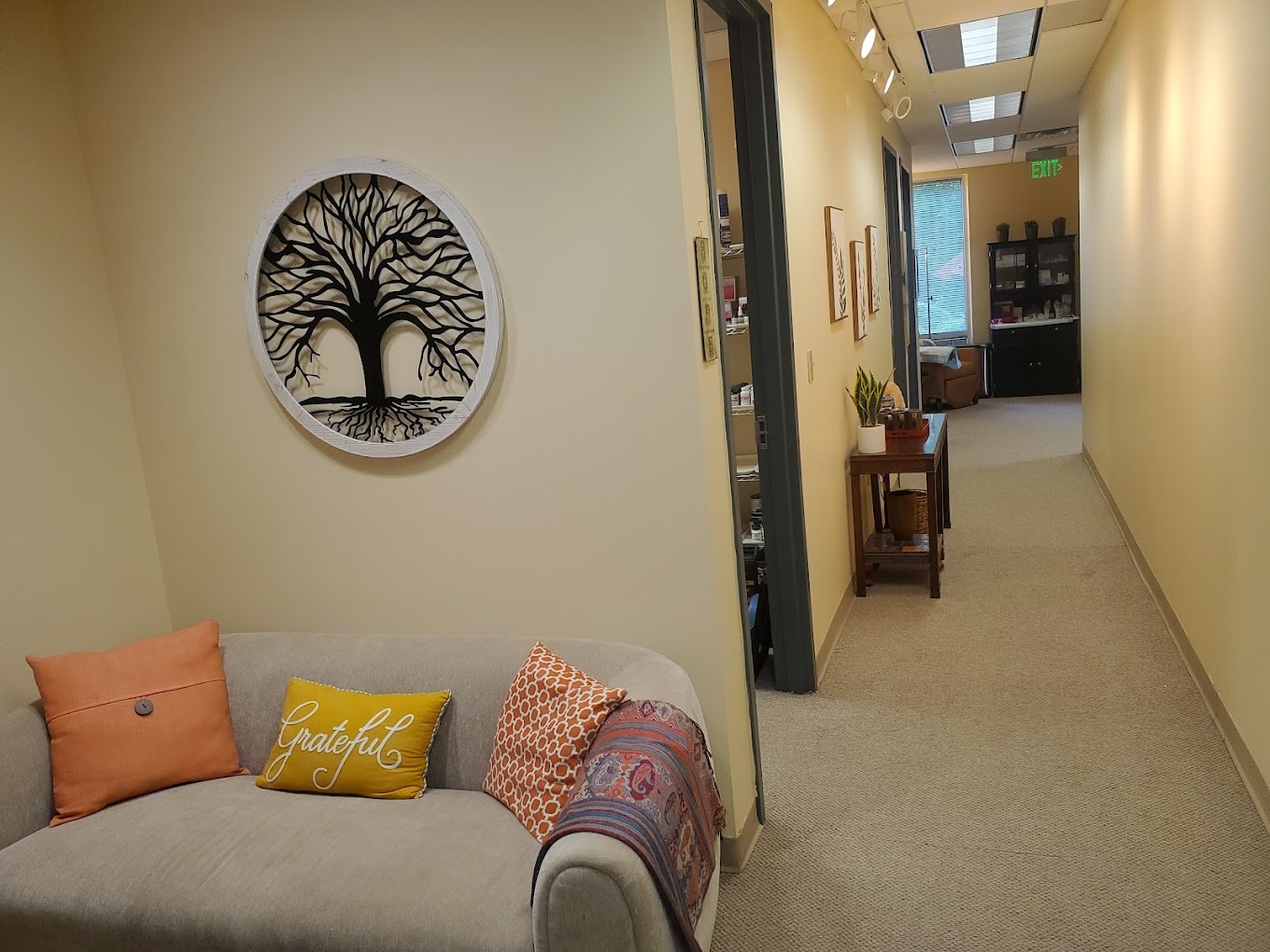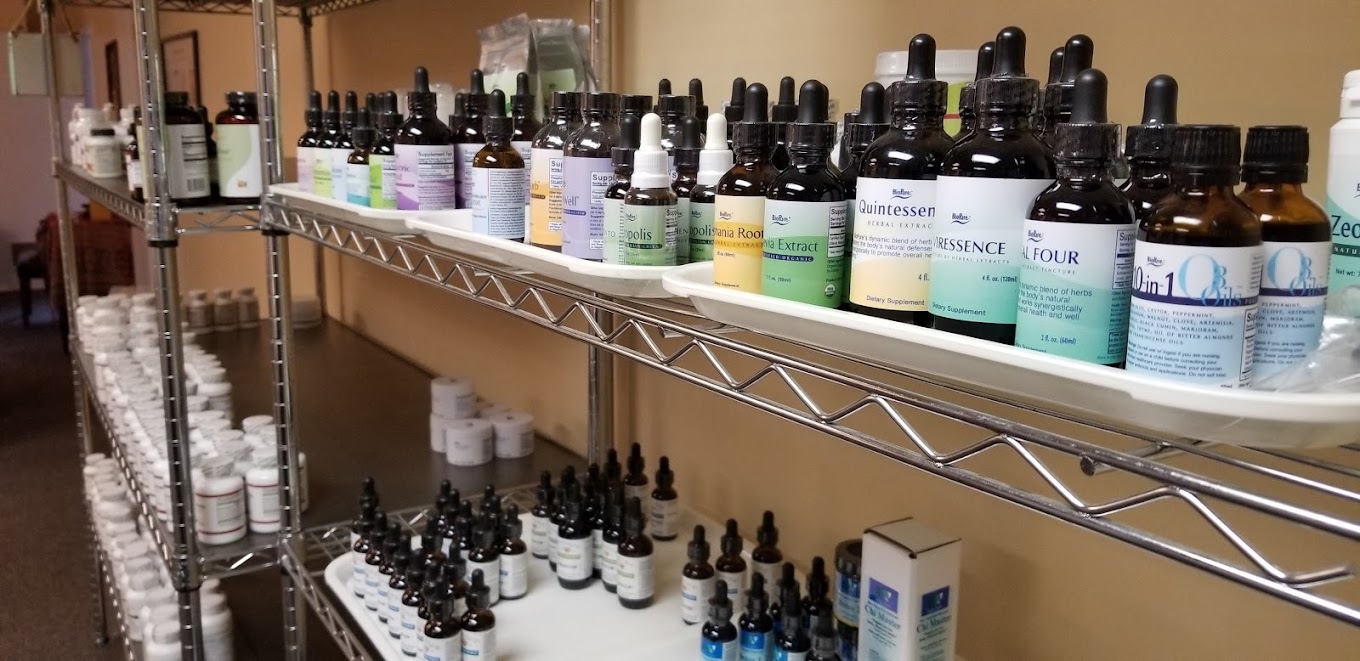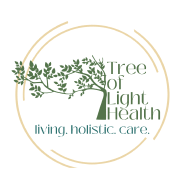We’ve Moved!
Welcome to Our
New Office in Tucker
Our 2,400-square-foot clinic features:
- Expanded IV therapy and treatment rooms
- New therapy and wellness areas
Holistic Care in Atlanta, GA
Tree of Light Health offers a compassionate, holistic approach to addressing chronic health issues through a blend of Traditional, Biological, Functional, and Integrative Medicine in Decatur and greater Atlanta, GA
Holistic Care in Atlanta, GA
Tree of Light Health offers a compassionate, holistic approach to addressing chronic health issues through a blend of Traditional, Biological, Functional, and Integrative Medicine in Decatur and greater Atlanta, GA
Over 40 years of combined experience in conventional and alternative medication.

Why Holistic Care
Do you find yourself pondering a myriad of questions about your health? From hormone imbalances to gut issues, nutritional deficiencies, and even concerns about Lyme disease, mold, or heavy metals…? The list can seem endless.
At Tree of Light Health in Atlanta, we understand that exploring each of these questions can consume both time and resources. Our promise is to help you efficiently and affordably uncover the root causes of your chronic health challenges, so you can progress on your healing journey.
Our Holistic Practitioners will provide you with a compassionate approach that blends Traditional, Biological, Functional, and Integrative Medicine. Our commitment is to provide honest and responsive care, with patient visits typically lasting 1-4 hours. Let’s embark on your path to well-being together!
Comprehensive Holistic Health Care in Atlanta
Tree of Light Health offers a compassionate, holistic approach to addressing chronic health issues through a blend of Traditional, Biological, Functional, and Integrative Medicine. Located in Atlanta, Georgia, we specialize in treating conditions such as hormone imbalances, gut issues, Lyme disease, mold toxicity, and more.
Our experienced team is dedicated to uncovering root causes of health problems and providing personalized, in-depth care. Patients can expect thorough consultations, a variety of treatment modalities, and a focus on long-term well-being.

Discover the Power of TruDOSE™ PRP Therapy
Unlock your body’s natural healing potential with TruDose PRP Therapy. This cutting-edge treatment uses personalized Platelet-Rich Plasma (PRP) to promote cellular repair, reduce inflammation, and support overall wellness.
Learn more about the incredible benefits of TruDose PRP and how it can transform your health journey

Harnessing Hyperbaric Oxygen Therapy (HBOT) for Chronic Illness and Peak Performance
At Tree of Light Health, we are proud to offer Hyperbaric Oxygen Therapy (HBOT) using our state-of-the-art Biobarica chamber, a semi-hard, medical-grade system operating at 1.5 ATA. This pressure setting allows for safe yet highly effective oxygen delivery to tissues impacted by inflammation, infection, or injury. Whether you’re navigating chronic fatigue, mold toxicity, Lyme disease, long COVID, or looking to optimize performance and cognition, HBOT is a powerful and restorative therapy.
Peptide Therapy – Unlock Your Body’s Potential
Discover the transformative benefits of peptide therapy at Tree of Light Health. Our specialized peptides are designed to support weight management, recovery, healing, and overall wellness. Popular Peptides We Offer:
- GLP-1s (Tirzepatide, Semaglutide, and More): Regulate blood sugar, reduce appetite, and promote weight loss.
- Melanotan II: Supports tanning and libido enhancement.
- Sermorelin & Tesamorelin: Stimulate natural growth hormone production for anti-aging and muscle recovery.
- CJC-1295 / Ipamorelin: Enhance muscle growth, fat loss, and sleep quality.
- BPC-157: Powerful tissue repair and anti-inflammatory benefits.
- AOD-9604: Supports fat metabolism and weight loss.
- PT-141: Enhances libido and improves sexual health.
- LL-37 (Antimicrobial Peptide): Supports immune function and fights infections.
- KPV: Helps reduce inflammation and supports tissue healing at the cellular level.
Why People in Atlanta Love Our Treatments
Trustindex verifies that the original source of the review is Google. I’ve been working with Dr Martin since this past August. I made phone call after phone after moving to Atlanta trying to find a functional med doctor to work with. I finally found Dr Martin who said he’d sit down with me for the time necessary to listen to my needs. Hard to find a doctor whose practice allows for that format of care. Dr. Martin’s evaluations are thorough. Helps you head to toe. Dr. Martin is clearly knowledgeable in many different fields of medicine. Dr Martin lays out a plan for you in a structured format at each visit. I am grateful to Dr Martin. I don’t know where I’d be without Dr Martin. Dr Martin truly cares about you. Dr Martin is a great person. I strongly recommend Dr. Martin for your health needs.Trustindex verifies that the original source of the review is Google. I have been working with Martin for almost a year, and he has been instrumental in helping me treat a number of complex health challenges, including brain fog, fatigue, insomnia, and gut-related issues. His comprehensive and naturopathic approach has not only helped me reduce my reliance on medications but also led me to the root causes of my health issues. One of the most significant discoveries was the presence of low-grade cavitation stress in my jawbone, which was contributing to many of my symptoms. Martin guided me to the right oral surgeon to address this issue, and I recently completed the necessary procedure. Prior to that, he also identified mold toxicity in my system and helped me find the right contractors and remediators to ensure my home was properly treated. While I still have a way to go, I am already noticing improvements in my sleep, energy levels, and overall well-being. Another standout aspect of working with Martin is his responsiveness—he provides incredible support between office visits, even after hours, which is something I have never experienced with conventional or naturopathic practitioners. I am truly grateful for Martin’s dedication and expertise, and I look forward to continuing this journey with his guidance. If you’re looking for a practitioner who genuinely cares and takes the time to get to the root of your health concerns, I highly recommend him.Trustindex verifies that the original source of the review is Google. Martin is a natural healer that truly cares about helping his patients feel better. I have been on a health journey for the past 8 years and have seen multiple practitioners all over the world. Martin has been integral in helping me manage and treat the effects of chronic Lyme, coinfections, mold, CIRS, EBV, parasites, long covid, etc. Instead of focusing on each of symptom and diagnosis, he thinks about the root causes and treats the terrain all while keeping bio individuality in mind. If you are looking for an intelligent, passionate, kind, and understanding provider to help you treat complex chronic conditions, I highly recommend scheduling an appointment with Martin at Tree of Light Health.Trustindex verifies that the original source of the review is Google. "I’ve been working with Martin since August 2021 to address several complex chronic health conditions, including heavy metal toxicity, dental cavitations, elevated blood pressure, and homocysteine levels. The care I’ve received has gone beyond managing symptoms—it’s been about uncovering and treating the root causes of my health issues using advanced tools like biofeedback, heart rate variability testing, genetic analysis, and naturopathic principles. Martin has been thorough, compassionate, and incredibly knowledgeable, helping me make significant progress in my health journey. I feel truly supported and confident in the direction of my care."Trustindex verifies that the original source of the review is Google. Dr van Lear is awesome!Trustindex verifies that the original source of the review is Google. I never go out of my way to write reviews because over the years nobody has helped me see the light until now. Prior to finding Martin I was running in circles, the classic doctor to doctor story, different money hungry functional medicine clinics, running to mexico for different treatments including lyme and stem cell protocols. I finally got lucky and found Martin. Within months my symptoms started to improve with his guidance and treatments, I was honestly baffled because I had been fighting so hard for so many years suffering and wasting money and energy away getting no where. So to finally see results felt like a miracle. I no longer had to spend hours on end trying to educate and self doctor myself either as I felt I finally found someone with a truly deep knowledge in the field of health. Whatever I thought I knew he was 1000 times more educated. I was able to trust and let go and that in itself was a weight off my back! If you’re lucky enough to have run across this man don’t hesitate to put your trust in him for your healing. He’s got your back, cares and is a genuine human being. If fighting lyme, mold, parasites, toxins, healing the gut or whatever nasty stuff you’re dealing with Martin is ready to go to war. I travel across the world just to come to his clinic in Atlanta, Georgia for my tru dose prp, energy work, and in between consult with him remotely. I’ve gone from 20% to nearly 70-80% healed in his care and i know I’m not far from 100. If you’re here reading this and in search of someone who can heal your chronic health issues… consider yourself VERY lucky!Trustindex verifies that the original source of the review is Google. Van Lear is an exceptional holistic practitioner who is very knowledgeable in his treatments. He's broad in understanding the weakness of the body and uses a diverse set of treatments to heal the body on a wholesome scale as he drives to do holistic care from an advanced treatment perspective. He and his staff (Charisse) have been very kind and helpful with any concerns I've had throughout this process. He has given me more understanding that the healing of the body is not something that is done overnight nor can be done in a month but that it needs to heal on its time and with learning and understanding and making foundational healthy habits along with the other options he has provided, my health is progressively improving as I'm continuing with him. He's been a significant benefit to my improvement.Trustindex verifies that the original source of the review is Google. Martin van Leer is a terrific doctor! I highly recommend. A holistic approach is a cheaper and more effective at healing certain ailments than going to a regular doctor. The medical field hasn't quite found the balance between when pharmaceuticals are necessary and when a more natural approach is necessary. In this rat race world, pharmaceuticals are being used as a quick fix to get you back to work, rather than giving your body time to rest and recover. I came to van Leer with: - Extremely bad menstrual cramps (used to take 12-16 ibuprofen for all five days that I bled), - Low energy (struggled to go hiking, skateboarding, driving long distances; even struggled with doing basic chores), - Joint pain after eating certain foods (a combination of hyperthyroidism and leaky gut). What I learned: it takes years to break your body down and there is no instant fix. It takes time building it back up. You have to give your body what it needs to heal (including doing something in a slower, lighter, easier way so that your body can heal) The more you strengthen your body the quicker it heals. The biggest things that your body needs to heal have to do with diet and rest. Diet meaning good food, good water and supplements. And just because your body is deficient in a specific supplement doesn't mean that just taking that supplement is going to help. Sometimes your body needs that supplement in combination with a few others to properly utilize it. And I can't say enough about rest. It's not enough to sleep 8 hours a night. If your circadian rhythm is off, you'll sleep but you won't wake up rested. If you work at a stressful job, the stress will break your body down. Think of it like exercising vs a fight or flight response. The first causes your heart to beat faster and makes the muscle stronger. The second causes your heart to beat faster but makes the muscle weaker, which contributes to arrhythmia and stroke. (And I haven't even gone into the negative side affects of stress on the digestive system, nervous system, cardiovascular system ECT.) After only 7 months of following his guidelines: - Changing the way I eat, - Changing the way I sleep and wake up - Taking the recommended supplements, - Following through with the suggested detox methods My menstrual cramps are a lot more bearable. They have gone down from painful to discomfort. (I'm still working my way to pain free.) My hyperthyroidism is under control. The last 5 months, my flare ups have been almost non-existent. (Still working my way to a healthy thyroid) My leaky gut is under control. I'm losing weight and gaining muscle. (Still working my way to a strong, healthy gut.) My low energy has decreased by a good 40%. I can do longer drives with more ease, do chores without becoming exhausted, and enjoy pleasurable activities like swimming, hiking and skateboarding. (Still working my way to a good energy level.) And a special shout out to Charise, who's always so helpful in answering my questions and assisting me with my supplement refills. 5 out of 5 stars ⭐⭐⭐⭐⭐

Reclaim Your Primal Trust
Discover the key to deep healing and self-regulation with Primal Trust.
Learn how to rewire your nervous system and restore balance in your life.
Conditions Our Holistic Approach Treats in Atlanta, GA

Weight Loss
CIRS (or Chronic Inflammatory Response Syndrome)
If you are experiencing some of these symptoms, you may have CIRS:
Headache
Light sensitivity
Memory issues
Word searching
Difficulty concentrating Numbness/tingling
Unusual skin-sensations
Red eyes
Blurred vision
Confusion/Brain Fog
Icepick-‐like pains
Mood disturbances
Vertigo Disorientation
Metallic taste
Tearing of the eyes
Body temperature
Body aches
Muscle pain
Shortness of breath
Sinus issues
Cough
Increased thirst
Urinary frequency
High or low appetite
Abdominal Pain
Gastrointestinal issues
Static shocks
Treatment:
Visual contrast sensitivity (VCS) testing measures the ability to see details at low contrast levels and is typically used as a nonspecific test of neurological functions
For more in-depth information on CIRS, read this article.
Advanced IV Therapy
Optimize Your Health with Advanced IV Therapy
Supercharge your wellness with our cutting-edge IV Therapy services. Whether you’re looking to boost immunity, detoxify, enhance recovery, or support chronic conditions, we offer customized IV solutions designed for your unique health needs.
✔ High-Dose Vitamin C – Immune & cellular repair
✔ Myers’ Cocktail – Energy & hydration boost
✔ Glutathione IV – Ultimate detox & anti-aging
✔ Ozone IV Therapy – Powerful immune & oxygen support
✔ Phospholipid Therapy – Brain & cellular membrane repair
✔ Specialty IVs – Tailored solutions for chronic fatigue, inflammation & more
🔹 Fast absorption. Immediate benefits. Medical-grade precision.
📍 Conveniently located in Decatur, GA
📅 Book your IV session today!
Candida Overgrowth
Some symptoms of Candida overgrowth may include:
Feeling tired, worn down, or suffering from chronic fatigue or fibromyalgia
In men, a red rash, itching, and burning on the penis.
In women, vaginal itching, soreness, and redness; a white, clumpy discharge from the vagina; and painful or uncomfortable intercourse
Difficulty concentrating, poor memory, lack of focus, ADD, ADHD, and brain fog
Severe seasonal allergies
Strong sugar and refined carbohydrate cravings
Irritability, mood swings, anxiety or depression
Digestive issues, including bloating, constipation, or diarrhea
Skin issues such as eczema, psoriasis, hives, and rashes
White coat on the tongue, redness or discomfort in the mouth, sore throat, difficulty swallowing, or cracking at the corners of the mouth
Skin and nail fungal infections, which include athlete’s foot or toenail fungus
Treatment:
Some natural treatments include Caprylic acid, oregano oil, garlic, and black tea, all effective treatments for candida overgrowths. The beneficial yeast S. boulardii was also effective against candida overgrowth, decreasing the inflammation from the overgrowth and the spreading of candida in the gut. Generally, a Candida diet with limits on starchy sugars, carbs, sweets, alcohol, and fermented foods is recommended.
For more info, please read this article.
Our Approach
We are both Research-based and Intuitive, and always take the necessary time to understand your problem and find solutions to treat the Root Cause, not just the Symptoms. We want you to know that We Care and We Understand your frustration, especially when it comes to dealing with complex and chronic health challenges.
Location: 2295 Parklake Dr NE Ste. 110, Atlanta, GA 30345
Phone Number: (404)877-2385





